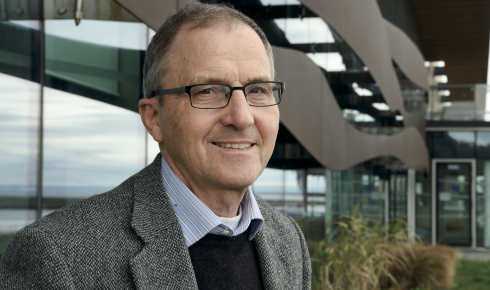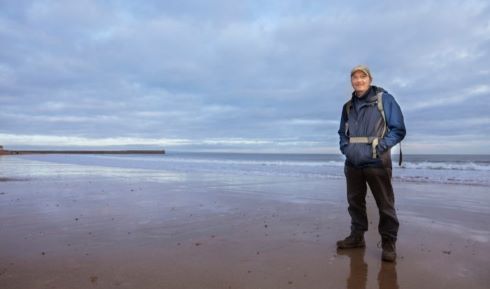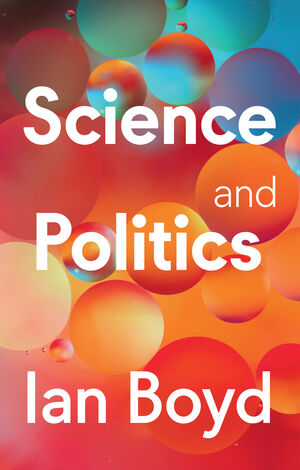Surviving ‘the politics factory’

Professor Sir Ian Boyd. Image by A.K.Purkiss.
21 February 2025
Professor Sir Ian Boyd gives an inside look at the challenges and absurdities that scientists face when working in government
In his new book, Science and Politics, RSB president Professor Sir Ian Boyd reflects on his time as a research scientist and expert adviser at the heart of government, arguing that science is nowhere near as integrated into decision-making as it should be. The book presents a series of ideas to resolve the fundamental tensions between science and politics, and Sir Ian argues that scientists should be involved in more decisions about how society is organised.
In this extract he describes the challenges of presenting evidence-based advice to ministers in the middle of a public and biology-based crisis.
Extract from Science and Politics by Ian Boyd
Issues erupt out of the ferment of the politics factory in what sometimes looks like random ways. One I experienced was set off by the influx of a disease of ash trees to Britain, known as ‘ash dieback’, in late 2012. This was just one of many introductions of tree diseases which happen fairly regularly, but for unknown reasons it caused a wave of fear in the imagination of the public and turned this event into a crisis. A national emergency was declared and politicians started to make ridiculous statements about eradicating the disease. Having the nation’s trees infected by a disease coming from continental Europe probably reflected deep-seated xenophobia. It sparked a process that is sometimes referred to as social amplification, which is the disproportionate exaggeration of relatively trivial issues probably reflecting deeper and unrelated pathologies.
 Ash dieback caused a wave of fear in the imagination of the public in 2012, rapidly turning it into a crisis
Ash dieback caused a wave of fear in the imagination of the public in 2012, rapidly turning it into a crisis
Although this is exactly what one would predict about the behaviour of a complex system, it is one thing to theorise about such behaviour but quite another to live through it and, perhaps, even be an influential node in the process of amplification. Ash dieback was first detected in Britain during the first few months of my tenure as a chief scientific adviser when I was still relatively naïve about how much influence I had. An off-hand comment I made saying that “native ash trees in Britain will gradually die out and be replaced by new species” and “Britain’s forests will never look the same again” appeared on the front page of the Daily Telegraph. This may have been part of the trigger process for the amplification, which resulted in media scrums outside government offices, pictures of me walking into COBRA meetings appearing on the national news, and many weeks of having to quell the desire for what seemed like every person and their dog to milk personal advantage from the situation. Even if nothing that has happened since has suggested my statements were not a correct assessment, it illustrated how very easy it can be to trigger non-linear effects inside the politics factory.
But the politics factory does have self-righting characteristics. As Tam Dalyell, veteran MP and a former ‘Father’ of the House of Commons, once explained to me, in the politics factory there are key moments when issues rise to prominence and once they pass, then they are gone forever. The noise in the echo chamber rises to a crescendo and then falls away as most people become disinterested or, more likely, one crisis is replaced by an even bigger crisis, which then attracts attention.
It is against this dynamic backdrop that science needs to be able to inject a sense of mature reflection and a feeling of constancy and stability. In more lucid moments, there is an understanding among some of those who are inside the factory that they need to look outside to take their bearings on the real world. This often happens informally, but there are also formal mechanisms, at least within governments, businesses and institutions. For example, advisory committees or even official offices often exist to do this translation, but technical experts skilled in everything from statistics and economics to nuclear chemistry might also be employed to ensure reality is not abandoned completely. Pivotal among these experts are people called chief scientific advisers (sometimes they go by the title chief scientist when they are a part of the executive structure).
I see these mechanisms and people as gateways between the world of the politics factory and the world of reality, especially the realities of nature. My role covered areas of food, agriculture, fisheries and environmental policy, and included everything from the chemistry of plastics to the dynamics of fish stocks, and from the top of the atmosphere to the deepest parts of the ocean. But sometimes it felt a bit like being an acute trauma physician at an asylum for people who self-harm.
 Professor Sir Ian Boyd has had a wide-ranging career, including being chief scientific adviser at Defra from 2012 to 2019
Professor Sir Ian Boyd has had a wide-ranging career, including being chief scientific adviser at Defra from 2012 to 2019
Scientific advisory systems exist to inject realism and expose flummery in the politics factory. They rely heavily on the integrity of processes used to summarise scientific information. One important example is the processes used to collect official statistics, which are designed to provide information about the true state of things. These statistics are generated using rigorous methods and governed by layers of oversight, which are specifically designed to stop them being manipulated for political ends.
However, anything that has importance is subject to subversion once it enters the politics factory. Some pressure groups and industry representatives inject their own biased research results into debates. Bombarding people with biased statistics is a common subversive tactic because it creates confusion about genuine, reliable scientific advice.
Trust built on a foundation of openness and truthfulness is the essential ingredient of any scientific advisory process. Those people who operate collaboratively within the politics factory in the mode of ‘brokers’ are likely to be most effective, but they have to also find ways of stopping themselves becoming corrupted by association. People with specific roles such as chief scientific advisers need to have the mechanisms to walk this narrow line between maintaining trust and becoming absorbed into the ways of the politics factory.
Walking this line is difficult and fraught with hazards. During the COVID-19 pandemic, in the UK we saw the vision of chief scientific advisers standing shoulder to shoulder with senior politicians who recited the mantra “we follow the science” when, in fact, those science advisers standing there knew this was not the case. It might have been more accurate to say that policy decisions were being informed by science, but it was part of the disingenuity of the political playbook to enforce science to align with political priorities in order to gain the trust of the public by placing trusted scientists alongside politicians.
Should these advisers have appeared in this way? Perhaps it was the only way to genuinely get their advice heard by the public, who, in this case, were the people who really mattered.
Nevertheless, these advisers can be critical entry points for science to influence within the politics factory. Knowing how to influence requires political intelligence and knowledge of the factory’s machinery. For example, government has special gateways to the influential centre of politics, which tend to be carefully guarded by civil servants, who act as the gatekeepers. Knowing the right people to contact and when to use the gateways can make a difference and reduces wasted effort hammering on the wrong door at the wrong time. Chief scientific advisers are present to help guide the way in which science can enter. [Former New Zealand chief scientific adviser] Peter Gluckman and colleagues have referred to them as “boundary actors” and “knowledge brokers”, who “translate the different languages of the two communities and align information needs and outputs”.
Whatever the descriptor, the job of these people is to help recognise when all the stars are aligned, meaning that the gateway is both open and the right route to take. Political scientist John Kingdon suggested these alignments call attention to issues that open political opportunities, and those who are best able to read those events and maximise the opportunities from them will be most successful.
Apart from knowing the gatekeepers, chief scientific advisers need to have certain attributes. These include the capacity to explain complex issues concisely and to frame technical problems accurately but in ways that are relevant to the context. Self-effacing honesty is also needed, especially about scientific uncertainty, and this can create challenges to credibility. Some people in the politics factory (who may not have experienced life outside its walls) may never have had a serious conversation in their whole lives with somebody whose purpose is to champion objectivity rather than to look after some sort of self-interest.
The chief scientific adviser needs a capacity to empathise, although not necessarily sympathise, with the problems and capabilities of the recipients of their advice, especially when this involves government ministers and officials. Some recipients of advice could not cope with having to deal with somebody who was not being political. I found that some politicians were incapable of thinking in the abstract or theoretically. I shall never forget the horror on the face of a senior cabinet minister when I tried explaining something in theoretical terms. The minister was incapable of thinking in the abstract, and was utterly lost and out of her depth. At the opposite extreme, on another occasion, I found myself recounting the paradox of Schrödinger’s cat to a minister who was genuinely interested in the meaning of reality and uncertainty. I have also worked with ministers whose political antennae were sharply tuned to identify scientists who were really pushing some sort of ideological agenda.

To be effective, scientific advice needs to be carefully packaged in ways that reflect certainty, impact and practicality, and there is a need to exercise judgement based on these three criteria. Certainty concerns the strength of the scientific knowledge or the firmness of the knowledge upon which the advice stands; impact is about the quantum of effect the advice is likely to have; and practicality is about the political cost as well as technical practicality. Getting the balance among these right requires inside knowledge of the politics factory and skill, without which science will have little impact.
Politics and Science is out now and published by Polity Books.
Professor Sir Ian Boyd is Bishop Wardlaw Professor at St Andrews University
and was chief scientific adviser at Defra from 2012 to 2019. He is currently president of the RSB.


